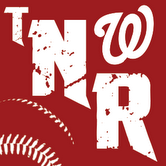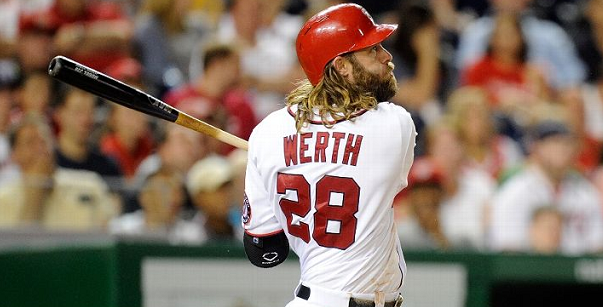The news that Jayson Werth retired today was only surprising in so much as the timing. As a Nats fan, he seemed to have done so already, or at least should have. He hadn’t hit well for the Nats at the end of 2017, but it’s easy to forget he was really good for them through mid-May last year. Then a slump, and a longer than expected DL stint, and he wasn’t the same.
The thing about Werth, though, was that he was always the same, even when he wasn’t the same. He had his ups and downs, but he was a 4+ win player twice with the Nats, and man, could he make a pitcher work. But whether it was his first season with the Nats when he hit .232/.330/.389 (almost exactly what he did in 2017, btw), or his third season with them, 2013, when he hit .318/.398/.532, Werth always seemed to have the same approach.
He was usually in the top 10 in pitches per plate appearance, and yeah, he had a good eye, but he always seemed to be doing something more than just spitting on bad pitches. Sure he did that – his percentage of swinging at pitches outside of the strike zone was one of the lowest in the league. But he always seemed to be able to foul off pitches. Maybe it just my memory of that 13 pitch AB he had to extend the 2012 NLDS, but that is the kind of hitter I think of him as – fouling off pitches until he got the right one, making pitchers work, and working hard himself.
From what I’ve read, people have a great appreciation for Werth because he signed here as a free agent when nobody else would. And it’s true, even with some big offers, other guys had turned down the money. But I don’t know if he should get so much credit for that. Heck, maybe if he said no, they spend money in a different way, and end up even better. Or maybe they spend it on Pujols or Prince Fielder in the following seasons, and its a disaster, who knows?
What I think is missed is less about the perception of the team to the outside world, and more about its perception of itself. He fixed the attitude, made them realize it was ok to win, and to be angry about losing. His leadership was a part of the turnaround from a team that never won to a team that consistently was in contention. Not just mentally, either – he insisted on improvements to the actual physical clubhouse, which made Nats Park a better place to play. Adam Kilgore wrote about it in his article:
He understood what a major league operation should be, and when the Nationals failed to meet the standard, he let people know.
Werth made recommendations — which the team acted on — about the food the Nationals serve in their clubhouse and the medical specialists they sent injured players to. He pressured ownership to invest in better workout equipment in the weight room. He insisted the Nationals expand auxiliary staff — batting practice pitchers, bullpen catchers.
Werth could be surly, and didn’t seem like a friendly guy, because he took baseball, and winning, so damn seriously. That was sort of new in Washington. Ask anyone who actually had a chance to interact with him one on one, and they usually have pretty good things to say about him. It was a “baseball is a serious job” attitude that turned some off, but he, and the Nats, thrived under it.
I heard a story, a few years back, that the Nats had considered cutting Werth loose before his contract expired. They still would’ve been on the hook for some serious money., but he wasn’t hitting at all, and he was no longer a good defensive outfielder. The team, though, told him their plans, and he realized he needed to make serious adjustments. He worked with someone and did just that, and he turned his season around.
But, by the end, he couldn’t do what he once did. The power never completely disappeared, but it faded, and he just wasn’t the same. He still walked, though, because Jayson Werth could work a walk like nobody’s business. And it wasn’t just a great eye, it was that ability to foul off pitch after pitch after pitch until the one he wanted to mash came, or until he got a free base. It always looked like he was doing work out there, that there was effort, not in a bad way, just in a way that made you respect what he did.
Werth might not have really ever been the best player on the Nats, and by the time the Nats were good, he almost certainly wasn’t. He won’t go in the Hall of Fame, he won’t be on the Nats’ Mount Rushmore. He was never my favorite player on the Nats, and it was frustrating to watch him at the end. But I admired him. I admired his approach, and his ability to consistently grind out at bats, whether he was the 2013 or the 2017 version of himself.
If, as Gandhi said, “Satisfaction lies in the effort, not in the attainment, full effort is full victory” then it is hard to argue that Werth’s time in Washington was anything but a victory

